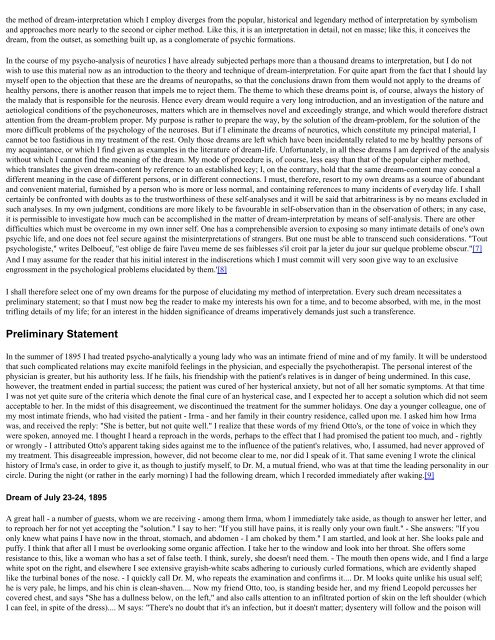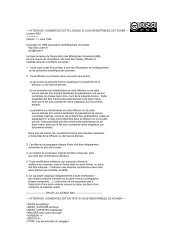The Interpretation of Dreams Sigmund Freud (1900)
The Interpretation of Dreams Sigmund Freud (1900)
The Interpretation of Dreams Sigmund Freud (1900)
You also want an ePaper? Increase the reach of your titles
YUMPU automatically turns print PDFs into web optimized ePapers that Google loves.
the method <strong>of</strong> dream-interpretation which I employ diverges from the popular, historical and legendary method <strong>of</strong> interpretation by symbolism<br />
and approaches more nearly to the second or cipher method. Like this, it is an interpretation in detail, not en masse; like this, it conceives the<br />
dream, from the outset, as something built up, as a conglomerate <strong>of</strong> psychic formations.<br />
In the course <strong>of</strong> my psycho-analysis <strong>of</strong> neurotics I have already subjected perhaps more than a thousand dreams to interpretation, but I do not<br />
wish to use this material now as an introduction to the theory and technique <strong>of</strong> dream-interpretation. For quite apart from the fact that I should lay<br />
myself open to the objection that these are the dreams <strong>of</strong> neuropaths, so that the conclusions drawn from them would not apply to the dreams <strong>of</strong><br />
healthy persons, there is another reason that impels me to reject them. <strong>The</strong> theme to which these dreams point is, <strong>of</strong> course, always the history <strong>of</strong><br />
the malady that is responsible for the neurosis. Hence every dream would require a very long introduction, and an investigation <strong>of</strong> the nature and<br />
aetiological conditions <strong>of</strong> the psychoneuroses, matters which are in themselves novel and exceedingly strange, and which would therefore distract<br />
attention from the dream-problem proper. My purpose is rather to prepare the way, by the solution <strong>of</strong> the dream-problem, for the solution <strong>of</strong> the<br />
more difficult problems <strong>of</strong> the psychology <strong>of</strong> the neuroses. But if I eliminate the dreams <strong>of</strong> neurotics, which constitute my principal material, I<br />
cannot be too fastidious in my treatment <strong>of</strong> the rest. Only those dreams are left which have been incidentally related to me by healthy persons <strong>of</strong><br />
my acquaintance, or which I find given as examples in the literature <strong>of</strong> dream-life. Unfortunately, in all these dreams I am deprived <strong>of</strong> the analysis<br />
without which I cannot find the meaning <strong>of</strong> the dream. My mode <strong>of</strong> procedure is, <strong>of</strong> course, less easy than that <strong>of</strong> the popular cipher method,<br />
which translates the given dream-content by reference to an established key; I, on the contrary, hold that the same dream-content may conceal a<br />
different meaning in the case <strong>of</strong> different persons, or in different connections. I must, therefore, resort to my own dreams as a source <strong>of</strong> abundant<br />
and convenient material, furnished by a person who is more or less normal, and containing references to many incidents <strong>of</strong> everyday life. I shall<br />
certainly be confronted with doubts as to the trustworthiness <strong>of</strong> these self-analyses and it will be said that arbitrariness is by no means excluded in<br />
such analyses. In my own judgment, conditions are more likely to be favourable in self-observation than in the observation <strong>of</strong> others; in any case,<br />
it is permissible to investigate how much can be accomplished in the matter <strong>of</strong> dream-interpretation by means <strong>of</strong> self-analysis. <strong>The</strong>re are other<br />
difficulties which must be overcome in my own inner self. One has a comprehensible aversion to exposing so many intimate details <strong>of</strong> one's own<br />
psychic life, and one does not feel secure against the misinterpretations <strong>of</strong> strangers. But one must be able to transcend such considerations. "Tout<br />
psychologiste," writes Delboeuf, "est oblige de faire l'aveu meme de ses faiblesses s'il croit par la jeter du jour sur quelque probleme obscur."[7]<br />
And I may assume for the reader that his initial interest in the indiscretions which I must commit will very soon give way to an exclusive<br />
engrossment in the psychological problems elucidated by them.'[8]<br />
I shall therefore select one <strong>of</strong> my own dreams for the purpose <strong>of</strong> elucidating my method <strong>of</strong> interpretation. Every such dream necessitates a<br />
preliminary statement; so that I must now beg the reader to make my interests his own for a time, and to become absorbed, with me, in the most<br />
trifling details <strong>of</strong> my life; for an interest in the hidden significance <strong>of</strong> dreams imperatively demands just such a transference.<br />
Preliminary Statement<br />
In the summer <strong>of</strong> 1895 I had treated psycho-analytically a young lady who was an intimate friend <strong>of</strong> mine and <strong>of</strong> my family. It will be understood<br />
that such complicated relations may excite manifold feelings in the physician, and especially the psychotherapist. <strong>The</strong> personal interest <strong>of</strong> the<br />
physician is greater, but his authority less. If he fails, his friendship with the patient's relatives is in danger <strong>of</strong> being undermined. In this case,<br />
however, the treatment ended in partial success; the patient was cured <strong>of</strong> her hysterical anxiety, but not <strong>of</strong> all her somatic symptoms. At that time<br />
I was not yet quite sure <strong>of</strong> the criteria which denote the final cure <strong>of</strong> an hysterical case, and I expected her to accept a solution which did not seem<br />
acceptable to her. In the midst <strong>of</strong> this disagreement, we discontinued the treatment for the summer holidays. One day a younger colleague, one <strong>of</strong><br />
my most intimate friends, who had visited the patient - Irma - and her family in their country residence, called upon me. I asked him how Irma<br />
was, and received the reply: "She is better, but not quite well." I realize that these words <strong>of</strong> my friend Otto's, or the tone <strong>of</strong> voice in which they<br />
were spoken, annoyed me. I thought I heard a reproach in the words, perhaps to the effect that I had promised the patient too much, and - rightly<br />
or wrongly - I attributed Otto's apparent taking sides against me to the influence <strong>of</strong> the patient's relatives, who, I assumed, had never approved <strong>of</strong><br />
my treatment. This disagreeable impression, however, did not become clear to me, nor did I speak <strong>of</strong> it. That same evening I wrote the clinical<br />
history <strong>of</strong> Irma's case, in order to give it, as though to justify myself, to Dr. M, a mutual friend, who was at that time the leading personality in our<br />
circle. During the night (or rather in the early morning) I had the following dream, which I recorded immediately after waking.[9]<br />
Dream <strong>of</strong> July 23-24, 1895<br />
A great hall - a number <strong>of</strong> guests, whom we are receiving - among them Irma, whom I immediately take aside, as though to answer her letter, and<br />
to reproach her for not yet accepting the "solution." I say to her: "If you still have pains, it is really only your own fault." - She answers: "If you<br />
only knew what pains I have now in the throat, stomach, and abdomen - I am choked by them." I am startled, and look at her. She looks pale and<br />
puffy. I think that after all I must be overlooking some organic affection. I take her to the window and look into her throat. She <strong>of</strong>fers some<br />
resistance to this, like a woman who has a set <strong>of</strong> false teeth. I think, surely, she doesn't need them. - <strong>The</strong> mouth then opens wide, and I find a large<br />
white spot on the right, and elsewhere I see extensive grayish-white scabs adhering to curiously curled formations, which are evidently shaped<br />
like the turbinal bones <strong>of</strong> the nose. - I quickly call Dr. M, who repeats the examination and confirms it.... Dr. M looks quite unlike his usual self;<br />
he is very pale, he limps, and his chin is clean-shaven.... Now my friend Otto, too, is standing beside her, and my friend Leopold percusses her<br />
covered chest, and says "She has a dullness below, on the left," and also calls attention to an infiltrated portion <strong>of</strong> skin on the left shoulder (which<br />
I can feel, in spite <strong>of</strong> the dress).... M says: "<strong>The</strong>re's no doubt that it's an infection, but it doesn't matter; dysentery will follow and the poison will









